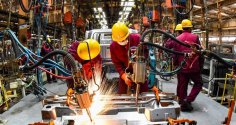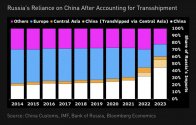You are using an out of date browser. It may not display this or other websites correctly.
You should upgrade or use an alternative browser.
You should upgrade or use an alternative browser.
Chinese Economics Thread
- Thread starter Norfolk
- Start date
I've been thinking about the reasons for the respective economic fortunes (and misfortunes) of China and the US, and I've come to the conclusion that the best explanation is the monetary cycles from Marx's Capital.
Two in particular are relevant to this analysis: M-M' and M-C-P-C'-M'. The former is dead simple, the capitalist advances money and gets back more money. This is finance capital in general - stocks, bonds, options, and other financial instruments. The latter is more complicated - the capitalist purchases industrial inputs, plants, hires workers, waits anxiously while his products are in production, then prays to the gods that he can sell for more than he paid to make them.
If you were a capitalist, which cycle would you rather your money be part of? Everyone would opt for the former. Who wants to take the risk and time and worry about competitors and strikes and commodity prices and a host of other factors beyond his control? Who needs that? I want more money now!
This is the reason for the "financialization" of the American economy. In a system where capital is politically ascendant, financialization is not a policy choice, it is an economic inevitability because this is where capital naturally flows. Conversely, in a system like China's where capital is subordinate to the state, the former parasitic cycle is suppressed in favour of the latter. The primary role of industrial policy and the state is to cultivate and guide the latter cycle in ways beneficial to society.
Two in particular are relevant to this analysis: M-M' and M-C-P-C'-M'. The former is dead simple, the capitalist advances money and gets back more money. This is finance capital in general - stocks, bonds, options, and other financial instruments. The latter is more complicated - the capitalist purchases industrial inputs, plants, hires workers, waits anxiously while his products are in production, then prays to the gods that he can sell for more than he paid to make them.
If you were a capitalist, which cycle would you rather your money be part of? Everyone would opt for the former. Who wants to take the risk and time and worry about competitors and strikes and commodity prices and a host of other factors beyond his control? Who needs that? I want more money now!
This is the reason for the "financialization" of the American economy. In a system where capital is politically ascendant, financialization is not a policy choice, it is an economic inevitability because this is where capital naturally flows. Conversely, in a system like China's where capital is subordinate to the state, the former parasitic cycle is suppressed in favour of the latter. The primary role of industrial policy and the state is to cultivate and guide the latter cycle in ways beneficial to society.
And people were still trying to push that point about China losing tons of money coz of US debt. By the time things get that bad, China will have cashed out.
And people were still trying to push that point about China losing tons of money coz of US debt. By the time things get that bad, China will have cashed out.
Japan has been increasing their holdings of US debt.
tariffs on both US and Taiwanese chemical products on the same day. This is rather interesting
Biden be like "i want to be xi jinping..."If this is what A COLLAPSING ECONOMY LOOKS LIKE every rationale and sane country would wish to be in China's enviable position.


